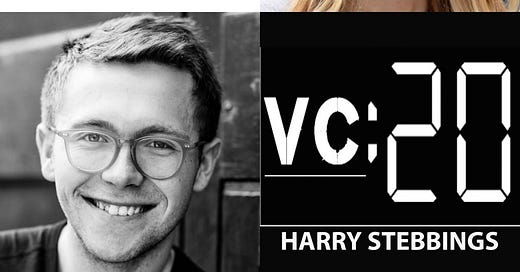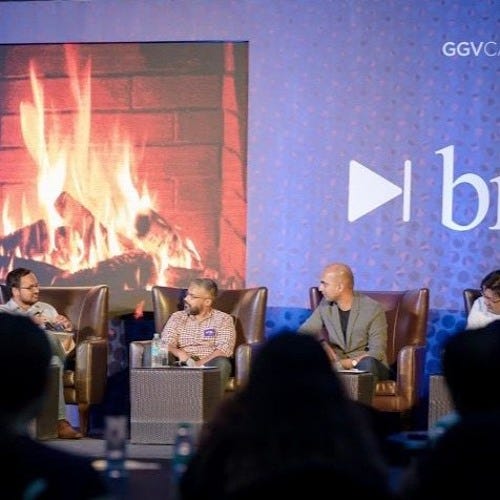"Everyone should be working together towards a shared goal and the best teammates are selfless.”
Alyson Friedensohn, Founder & CEO @ Modern Health, VG, co-founder @ Udaan, Manu, Global VP of Xiaomi & Managing Director of Xiaomi India, Hans Tung, Managing Partner @ GGV
20VC: Biggest Lessons from Working with John Doerr, How Founders Can Have Discussions of Vulnerability with Their Board and Investors & Marrying Another Founder; The Pros, Cons and Ways To Make it Succeed with Alyson Friedensohn, Co-Founder & CEO @ Modern Health
(November 30, 2020 - 36 minutes)
Alyson Friedensohn is the Founder & CEO @ Modern Health
The Twenty Minutes VC - Venture Capital, Startup Funding, The Pitch
By Harry Stebbings - Founding Partner @ Stride.vc & Founder of 20VCMicrofund
How Alyson Built Resilience
Everyone reaches their potential in different ways, and it's important that reaching it also allows you to feel fulfilled. Alyson credits her resilience now to the difficult time where she had to balance sports, classes, and tests. It's not always about you but about reaching your potential which will allow you to be fulfilled.
As a founder, is it okay to be open with my mental health?
Many times we think of mental health as people in crisis mode when it really is a full spectrum. Most founders actually struggle with mental health, and sometimes, that is also why they become successful. Being more vocal does not mean that you're weak but instead can show that you're constantly striving to improve
How do I start if I have no technical skills?
If you think about some of the best female founders and leaders, they're not technical by background. One of the most important things in starting a company is actually playing to your strengths. It's also more important that you figure out the product-market fit and iteration than being technical.
How can I build my sales process?
In the early days, it's probably a lot easier because when your conviction is so strong, it just comes through; but what was helpful to Alyson was setting up the sales force from an operational perspective. She learned how to use her operations experience as a strength which helped set the foundation of sales at Modern Health.
What was the most challenging element?
During the earlier days, the biggest challenge was taking in various feedback while trying not to go off course. While it's good to get feedback, it's about making sure that you're pattern matching and collecting data before choosing to change directions.
Alyson's tip is to be really diligent with each stage in the sales cycle, and not pass and skip them until you check off certain boxes and criteria.
How can I optimize the onboarding process?
Make sure it's repeatable; Alyson and her team built a sales playbook inclusive of everything from how you onboard to training, and do live demos before they hop on a call with potential customers.
The goals we've set, are they too high?
This really comes down to being really open, honest, and transparent with your team, especially with the leaders. Ultimately it's more of finding the right people on the team who can set themselves up for success and have the self-awareness of whether they'd be able to reach high goals without making it impossible.
Okay, where can I find the right people then?
The first thing is by being your authentic self and being vulnerable about what your values are. By embedding your values in your culture, you will attract certain types of people who embody them. Don't focus too much on a certain skill set and remember that you're looking for the best people who can solve your problems.
For Alyson and her team, they look for general athletes; people who embody their values and while they may not have the necessary skill set, someone who's really strong on taking action is what they strongly look for in an individual.
What about selecting investors?
What's most important is making sure that you find people that you'd be excited to work with. Most founders tend to optimize for valuation over who will actually get down and dirty with the team when the time calls for it; so would you want someone who could coach and set you up for success, or one who sees you merely as a potential return?
For Alyson, they want to work with people who believed in their mission, and by choosing investors they could lean on when they needed to, it not only impacted the business but the whole experience. Her basic litmus test is to see if she looks forward to board meetings or dreads them.
Is being vulnerable with investors really okay?
There's something about being vulnerable with investors that could build a sense of trust and makes them want to work with you; it shows that you really want to pull them in and be in it for the long haul with their help whereas if you feel like you can't be transparent with them, the trust isn't as strong.
Marrying another startup CEO, what's that like?
Pros being you will have someone by your side who really gets what you're going through; they can celebrate your wins and support you through your losses, which is incredibly valuable. Cons being that it's difficult to turn off, especially when you're both so entrenched in your work.
Any special relationship advice?
Find fulfillment yourself before looking and partnering with someone else; when that becomes your foundation, the person you're meant to be with will fall into place and won't have to fit in a box.
Live in Bangalore: Fireside Chat with VG from Udaan, Manu from Xiaomi and Hans from GGV
(October 9, 2019 - 46 minutes)
Vaibhav Gupta, co-founder at Udaan
Manu Kumar Jain, Global Vice President of Xiaomi and also the Managing Director of Xiaomi India
Hans Tung, Managing Partner @ GGV
Evolving for the Next Billion
The phrase means building solutions for the larger population of India. Indian citizens have the money and are willing to try new things that work for them, so tech companies need to understand the users, be open to feedback, and respond quickly to issues. Users in India have different religions, languages, and cultures, therefore different configurations should be considered for each product. The mass market is much bigger than what is possible – just figure a way to get people on your app during their free time and it’s a massive business.
Besides, India has a huge talent pool. Hans predicts that Indian startups will exceed one-third of the wealth of the new economy in the next decade.
Going Online
In a traditional marketplace, discovery, payment, logistics, and trust establishment are simultaneously done in a single transaction over the counter. Moving to an electronic marketplace, the expectation of the buyer and seller and the problem statement change – existing services were designed for an offline world, so these services also need to be redesigned for the new way of doing commerce.
How Xiaomi Boomed in India
Xiaomi initially faced three challenges: a tiny online market (only 6%), a hard-to-pronounce name, and no marketing budget. Now, it’s one of the largest tech brands in India. Manu attributes it to 3 things:
1. A great product that’s innovative, high quality, and competitively priced;
2. A team of people with different mindsets and are willing to take risks and try things differently;
3. Freedom to make mistakes and grow.
Xiaomi’s fast-paced environment prompted the team to make quick decisions and skip mundane tasks like email communications and PowerPoint presentations. 90% of conversations happen on chat apps and emails are only reserved for formalities. Most importantly, team leaders are approachable and often sit with their members.
Customization to the Last Person
Xiaomi applies 3 models when bringing in products from China:
1. Products suitable for India with small modifications made (e.g. dual SIM smartphones);
2. Products not suitable for India (e.g. standing scooters);
3. Products specifically made only for India (e.g. beard trimmers, water purifiers).
The consumer’s feeling of empowerment is the key to a business’ success. Figure out what the company does, address the consumer’s pain points, and make them feel happy with you.
The Importance of a Great Team
Timing is everything, but great team members bring the company beyond expectations.
Companies in different stages need different ‘DNA’s, for example, getting energetic, ambitious people onboard very early on. During the hiring process, instead of evaluating people’s strengths and weaknesses, ask instead if he has a high probability of making right or wrong decisions. See whether the person is ‘experimentative’ and willing to take risks or not. Look for long-term commitment.
Manu personally looks for basic intelligence, passion, and someone whom he can trust and respect. It takes time to master the art of hiring people, but the more you do, the better you get at it.
Advice for Founders
It really depends on the founder’s own DNA and cultural fit to see what kind of company makes sense for them. The founder product fit and founder market fit are both important for scaled growth – are they doing something that fits their personality? Then, recruit people sharing the same ethos and philosophy, execute it consistently, and don’t get too many different approaches tied up internally to increase chances for success.
Keeping the Passion
The first few months are about survival, but as people work with you and start sharing, believing, and shaping the vision with you, that’s what helps keep you going. Talking to someone you can confide in, like a mentor or a spouse, also helps keep the passion alive. Similarly, you get a sense of accomplishment after proving the success of your product to people who were skeptical about your ideas.
Thanks for reading. Reach us @Twitter / @Facebook with tips and feedback or by leaving a comment to our post here. Remember to share if you like what you read.
If you are hungry for more of Podtakes, do check out our Archive here for more.





